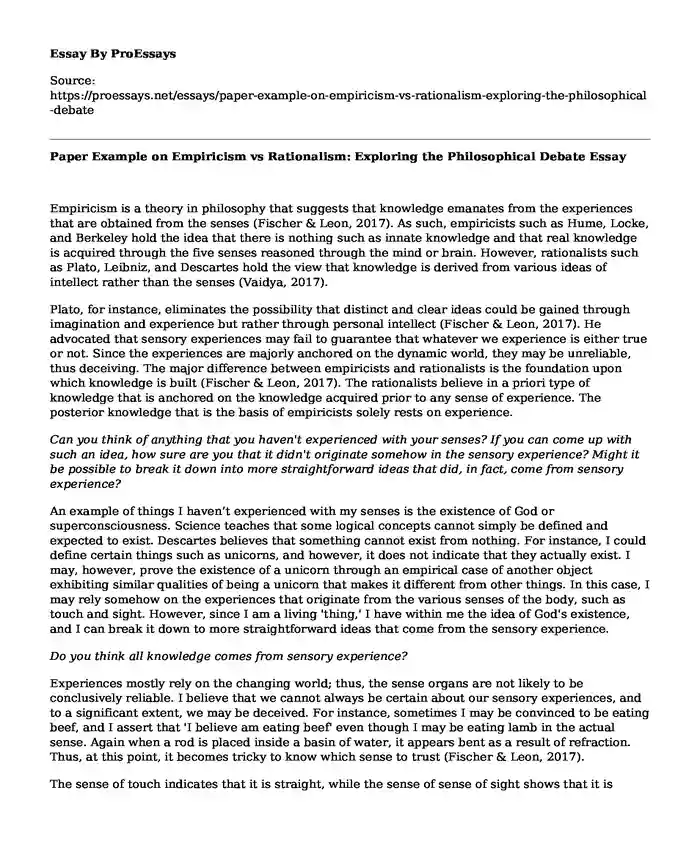Empiricism is a theory in philosophy that suggests that knowledge emanates from the experiences that are obtained from the senses (Fischer & Leon, 2017). As such, empiricists such as Hume, Locke, and Berkeley hold the idea that there is nothing such as innate knowledge and that real knowledge is acquired through the five senses reasoned through the mind or brain. However, rationalists such as Plato, Leibniz, and Descartes hold the view that knowledge is derived from various ideas of intellect rather than the senses (Vaidya, 2017).
Plato, for instance, eliminates the possibility that distinct and clear ideas could be gained through imagination and experience but rather through personal intellect (Fischer & Leon, 2017). He advocated that sensory experiences may fail to guarantee that whatever we experience is either true or not. Since the experiences are majorly anchored on the dynamic world, they may be unreliable, thus deceiving. The major difference between empiricists and rationalists is the foundation upon which knowledge is built (Fischer & Leon, 2017). The rationalists believe in a priori type of knowledge that is anchored on the knowledge acquired prior to any sense of experience. The posterior knowledge that is the basis of empiricists solely rests on experience.
Can you think of anything that you haven't experienced with your senses? If you can come up with such an idea, how sure are you that it didn't originate somehow in the sensory experience? Might it be possible to break it down into more straightforward ideas that did, in fact, come from sensory experience?
An example of things I haven’t experienced with my senses is the existence of God or superconsciousness. Science teaches that some logical concepts cannot simply be defined and expected to exist. Descartes believes that something cannot exist from nothing. For instance, I could define certain things such as unicorns, and however, it does not indicate that they actually exist. I may, however, prove the existence of a unicorn through an empirical case of another object exhibiting similar qualities of being a unicorn that makes it different from other things. In this case, I may rely somehow on the experiences that originate from the various senses of the body, such as touch and sight. However, since I am a living 'thing,' I have within me the idea of God's existence, and I can break it down to more straightforward ideas that come from the sensory experience.
Do you think all knowledge comes from sensory experience?
Experiences mostly rely on the changing world; thus, the sense organs are not likely to be conclusively reliable. I believe that we cannot always be certain about our sensory experiences, and to a significant extent, we may be deceived. For instance, sometimes I may be convinced to be eating beef, and I assert that 'I believe am eating beef' even though I may be eating lamb in the actual sense. Again when a rod is placed inside a basin of water, it appears bent as a result of refraction. Thus, at this point, it becomes tricky to know which sense to trust (Fischer & Leon, 2017).
The sense of touch indicates that it is straight, while the sense of sense of sight shows that it is actually bent. In this case, prior knowledge of the laws of refraction is essential in understanding that the rod is not bent but undergoing refraction (Vanzo, 2013). As such, I believe sensory experiences cannot be relied upon entirely in making a conclusion on the knowledge of the environment around us. Therefore, it is essential to note that not all knowledge comes from experience. John Locke believed that the mind is a tabula rasa, which is blank and ready to gain knowledge from the surrounding world (Vaidya, 2017).
References
Fischer, B., & Leon, F. (Eds.). (2017). Modal epistemology after rationalism. Springer International Publishing.
Vaidya, A. J. (2017). Modal knowledge: Beyond rationalism and empiricism. In Modal epistemology after rationalism (pp. 85-114). Springer, Cham. https://link.springer.com/chapter/10.1007/978-3-319-44309-6_6
Vanzo, A. (2013). Kant on empiricism and rationalism. History of Philosophy Quarterly, 30(1), 53-74. https://www.jstor.org/stable/43488058?seq=1
Cite this page
Paper Example on Empiricism vs Rationalism: Exploring the Philosophical Debate. (2023, Nov 18). Retrieved from https://proessays.net/essays/paper-example-on-empiricism-vs-rationalism-exploring-the-philosophical-debate
If you are the original author of this essay and no longer wish to have it published on the ProEssays website, please click below to request its removal:
- Personal Ethics and Decision Making - Essay Sample
- The Ethics of Police Deception During Interrogation Essay
- Essay Example on Abortion: Thompson's Justifications and Objections
- Essay Example on Meritocracy: A False Dream for Many Americans
- Essay on Frankenstein Experiment: Challenge on Ethics and Morality
- Paper Sample on Test Reliability and Validity: Ensuring Accurate Results
- Essay on Ethics in the Realm of Organ Trafficking







